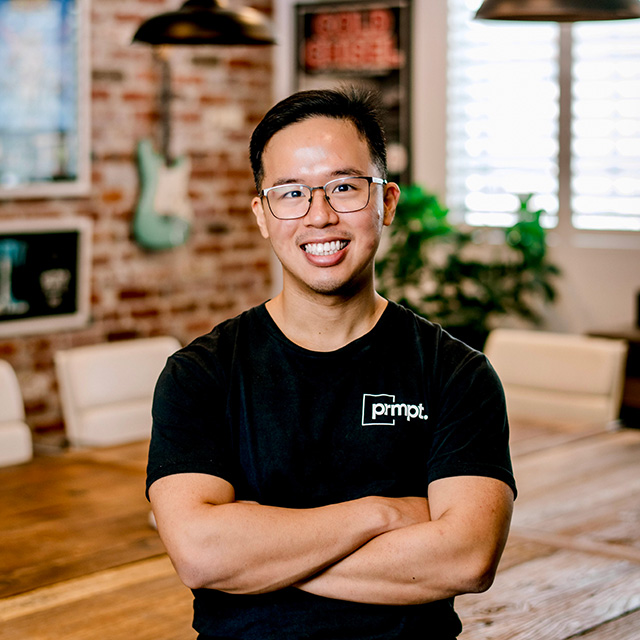Lucas Ngo Dee: Across the biotech ecosystem
Lucas Ngo Dee is all about understanding biotech’s broader commercial and economic landscape. As an R&D consultant at prmpt, he helps companies access federal government incentives for research and development, gaining a front-row seat to how different industries tackle innovation.
“What we do is apply for tax incentives for companies conducting R&D,” he explains. “It’s taken me outside of biotech and into industries like construction, recycling and artificial intelligence. It’s given me a much greater appreciation for how diverse research is and where biotech fits in that landscape, and how governments handle risk across different industries.”
Lucas graduated with a Master of Biotechnology from The University of Queensland in 2020. His career so far has given him a refined perspective on the commercial realities of biotech. “Translating or commercialising research isn’t easy. In university, you hear about it in the classroom, but in the real world, it’s different — there’s real money on the line, and people, governments, or companies invest in projects that don’t always pan out. I’ve come to truly appreciate the impact of that.”
Making an impact: Mission-driven innovation
Although still early in his career, Lucas sees himself as mission-driven. “If I believe in a project, I’m more personally invested in it,” he says.
“It doesn’t have to be a game-changer, but it should benefit society in some way. That’s what drives me.”
He is particularly interested in how to make biotech research more economically viable. “Biotech research is incredibly expensive, and returns can take years — if they come at all. You could invest $20 million into a project and see nothing back. That’s where the challenge lies: How do we make drugs cheaper? How do we de-risk drug development? How do we democratise biotech research so that everyday consumers can understand and appreciate its value?”
The future of biotech: Economic and scientific challenges
When asked about the most exciting biotech developments of the last 25 years, Lucas highlights the refinement of research tools. “We now better understand the link between molecular mechanisms and practical health outcomes. Take the gut-brain axis, for example – we’re learning how gut health influences brain health.”
However, his biggest takeaway from his current role is the commercial challenge of biotech. “Research is expensive, and biotech innovation is magnified 1,000 times because of the risk involved. The question isn’t just what the next big discovery is — it’s how we make it [economically] viable.”
Despite these challenges, he remains optimistic. “I still appreciate the incredible research happening – whether in genetics, neuroscience, or novel energy sources. My perspective has just become more refined, more commercially aware.”
Resilience and leadership at UQ
Lucas’ time at UQ was marked by both opportunities and setbacks — particularly during the COVID-19 pandemic. “2020 was supposed to be a great year for me. I was working on a commercialisation project with the Queensland Brain Institute (QBI) and was selected for a defence project through the Business School. We were meant to visit the air base in Annerley multiple times, but then March happened.”
While many of those opportunities were lost due to the pandemic, Lucas focused on making the most of what he could. He co-founded the UQ Biotech Society that year, creating a platform for students to connect with biotech professionals. “I didn’t want to be president – I just wanted to put the pieces in place for the next person to take it forward,” he says.
Despite the ups and downs, Lucas sees that year as pivotal. “2020 built a lot of character. There was a cycle of hope, disappointment, hope again, and ultimately, resilience.”
Advice for future biotech students
Lucas sees a common challenge among science students: handling failure. “In research, 95% of your experiments won’t work. Not because you’re not skilled, but because that’s the nature of science. The problem is, many students take that failure personally.”
His recommendation? Find a mentor. “It could be a professor, a sibling, or a parent — someone who has your best interests at heart. I’ve been lucky to have Lisette Pregelj [Deputy Director of the biotech program] as a mentor. She helped me appreciate that failure and disappointment are part of the process.”
He also believes STEM students are well-equipped to excel in any field. “STEM trains you to think analytically and solve problems. If you apply that mindset, you can succeed in biotech — or even in tech, sales, or any other industry.”
Looking ahead Lucas’ career has already given him a unique perspective on biotech — both its scientific promise and its commercial reality.
“My career so far has opened my eyes to the economic challenges of biotech. But I still believe in its potential. The key is figuring out how to make it sustainable and accessible.”
From launching a student biotech society to working across multiple industries, Lucas’ journey is a testament to adaptability and resilience. “I don’t know exactly where I’ll be in 10 years,” he says. “But I know I want to be working on something that makes a real impact.”


 Read more inspiring stories from UQ biotechnology alumni
Read more inspiring stories from UQ biotechnology alumni